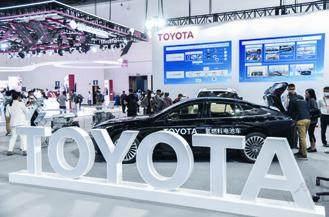STILL A HOT LAND
2022-05-30ByTaoXing
By Tao Xing

‘The Great China Exit,” a trend- ing topic with many overseas media outlets. Recent months have seen a lot of coverage about foreigninvested companies planning to shift some of their manufacturing away from China. For example, a Bloomberg report on July 5 read: “Rattled by the most recent wave of strict COVID-19 lockdowns in China, the long-time manufacturing hub of choice for multinationals, CEOs have been highlighting plans to relocate production.”
In this regard, Zhang Jianping, Deputy Director of the Academic Steering Committee of the Chinese Academy of International Trade and Economic Cooperation, told Beijing Review, “The two-way flow of investment is a normal economic phenomenon, as long as its not a kind of explosive capital flight in a short period of time and does not too negatively impact economic and social development.”
“Many labor-intensive industries are leaving China, but new foreign investment projects with higher added value will come,”Zhang said, adding this is a normal course of dynamic adjustment in Chinas pursuit of economic restructuring and high-quality development.
A rising trend
U.S. technology and manufacturing giant Honeywell signed an agreement with the Administrative Committee of the Tianjin Port Area of the China (Tianjin) Pilot Free Trade Zone (FTZ) last November at the Fourth China International Import Expo(CIIE).
According to the agreement, Honeywell will set up a research center featuring a distributed automatic control system, intelligent factory safety management solutions and smart sensing technology in Tianjin, which would in turn help lift Chinas smart manufacturing and digital development.
The project, worth $25 million, had entered the trial operation stage as of September.“As China explores new heights in its opening up, Honeywell will continue its development strategy, using its science and technology advantages to help Chinas high-quality development while seeking business growth,” William Yu, President of Honeywell China, told Beijing Review.
Even in the pandemic-battered 2021, paid-in foreign direct investment (FDI) in the Chinese mainland surpassed 1 trillion yuan ($140.28 billion) for the first time, marking the countrys first double-digit growth in nearly a decade, according to the Ministry of Commerce (MOFCOM).
MOFCOM data showed the Chinese mainlands actual use of foreign capital expanded 16.4 percent year on year to 892.74 billion yuan ($125.24 billion) in the first eight months of this year. In U.S. dollar terms, volume went up 20.2 percent year on year. During the period, paid-in FDI in the service industry jumped 8.7 percent year on year to 662.13 billion yuan ($92.88 billion), while that in hi-tech industries surged 33.6 percent from a year earlier. Specifically, the investment in hi-tech manufacturing rose 43.1 percent from the same period a year ago, while that in the hi-tech service sector gained 31 percent year on year.
Against a backdrop of global uncertainty and the effects of deglobalization in recent years, Chinas foreign capital inflow has shown a tendency of steady increase, demonstrating just how foreign investors have both an upbeat long-term view of the Chinese market and a long-term commitment to operating in China, according to Zhang.
Wang Wei, an official with the Ministry of Industry and Information Technology, told a press conference on September 15 that“China is and always will be a hot land for overseas investment.”
Overseas-funded projects cover major industries like electronics, information, green energy and vehicle production. In terms of the manufacturing sector, China had nearly 60 leading overseas-funded projects, each with an investment of over $1 billion, “bringing their total investment in the country to more than$200 billion,” according to Wang.
Trekking on
The rising trend is inseparable from the development of the past few years. In the past decade, new progress has been made in expanding domestic demand and boosting consumption, and China has grown into the worlds second largest consumer market—second only to the U.S., according to a press conference hosted by the Publicity Department of the Communist Party of China Central Committee on May 20.
Besides, China is the only country recognized by the United Nations as having a complete industrial system and its infrastructure in many fields, especially transportation, is of higher operational efficiency than that of many developed countries, according to Zhang.

“These advantages make China a very important gateway for multinational companies aiming to engage the Asia-Pacific market and have contributed to the continuous increase in foreign investment in the country,” Zhang said.
Whats more, Chinas negative list for foreign investment access, a document that defines industries prohibited or restricted to international capital, has been shortened for five consecutive years since 2017. On January 1, 2021, the Foreign Investment Law came into force to offer easier market access for foreign capital, step up protection for foreign investors and make market competition fairer. One key provision of said law is the state “shall give national treatment to foreign investment beyond the negative list.”
“Chinas continuous optimization of its business environment and its policy reforms boost the confidence and determination of foreign-funded enterprises to put down roots in the Chinese market and execute long-term strategies,” Leon Wang, Executive Vice President and International and China President of AstraZeneca, told Beijing Review in a June interview.
Meanwhile, China is also broadening market access for foreign capital through the establishment of FTZs, coupled with the countrys ongoing expansion of negotiations to sign free trade agreements.
Since the first FTZ was launched in Shanghai in 2013, such zones in different regions of China have become FDI magnets due to the preferential policies and streamlined services they offer. The Tianjin Port Area of the Tianjin FTZ, for example, provided practical convenience for the Honeywell projects site selection and launch. The area continues to intensify the optimization of its business environment by establishing a mechanism to create direct links with enterprises and improving services.
In the past decades, the company has received policy support and other services through the support of government departments at all levels, Honeywell wrote on WeChat, Chinas most popular social media service, on August 4.
Besides, China has been growing its free trade area network since its accession to the World Trade Organization in 2001. So far, the country has signed 19 free trade agreements with 26 countries and regions, with partners covering Asia, Oceania, Latin America, Europe and Africa, Shu Jueting, a spokesperson for MOFCOM, told a regular press conference on September 22.
China will ink more free trade agreements with willing partners, and work to enhance the effectiveness of these agreements to benefit both businesses and people better and faster, Shu added.
“The next step for China would be to see to it that local governments develop their abilities to serve foreign enterprises,” Zhang suggested.
The countrys four global expos, two of which were launched in the past decade, are another great asset. The events, namely, the China International Fair for Trade in Services in Beijing, the Canton Fair or China Import and Export Fair in Guangzhou of Guangdong Province, the China International Consumer Products Expo in Haikou of Hainan Province, and the CIIE in Shanghai have a starring role in the upgrading of Chinas business environment.
“Investors and parties seeking investment can meet at these gatherings,” Zhang said. BR
